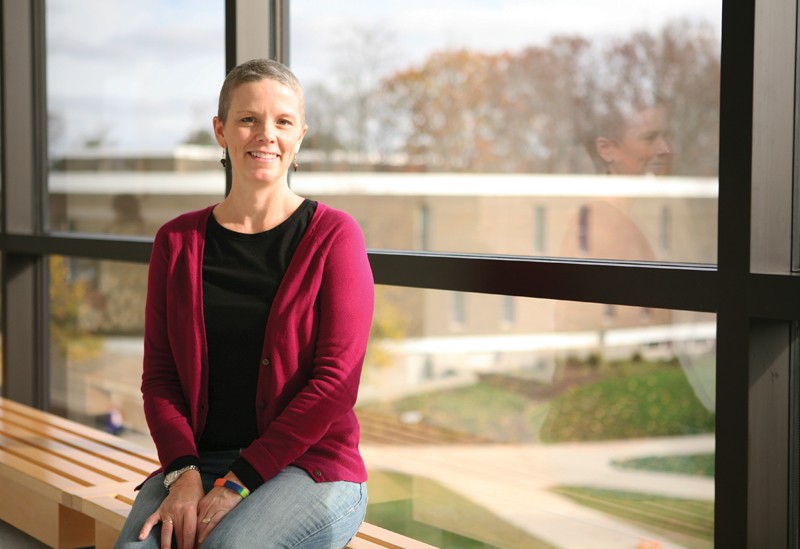Professor battles cancer, reaches out to campus support system

Oct 28, 2012
On March 27, 2012, just a few days before Ingrid Johnson’s birthday, the phone rang. What she didn’t know was that this was the phone call that was about to change her life. This phone call would be the results from her biopsy.
She had breast cancer.
Johnson, who is an assistant professor in the movement science department, always considered herself an active and healthy person. Once she found out she had triple-negative breast cancer, an aggressive form, she was in shock. She also later learned that she would need a double mastectomy.
“When you get the phone call that says, ‘Your biopsy results came back and you do have cancer,’ you start to panic,” Johnson said. “What does this mean? Is it treatable, is it not treatable? How am I going to tell my children? Your mind sort of starts to spiral.”
Under the knife
Johnson went on to have her double mastectomy surgery on April 17. Initially when she was diagnosed, she was able to continue teaching physical education classes with no issue, but after the surgery she found teaching more difficult. She was restricted from daily physical activities such as lifting and driving for a six-week period.
“I am a PE teacher, so my job is pretty physical,” she said. “My classes take place at the tennis courts, in the turf building, at an archery range and in a gym. It’s frustrating for me personally because I like to be an active person, but I think it’s made me a better teacher because I had to find other ways to make sure my students are learning the information they need to learn. It’s sort of a mixed blessing.”
Due to the severity of her cancer, Johnson had to endure four cycles of two chemotherapy medications every 21 days. The sessions required many pre-medications to be taken to prevent symptoms from the chemo, and would last between six and eight hours.
During this process she tried to live her life as normal as possible, but realized that she needed to ask for more help than she initially thought.
“I thought I could do this on my own, but the thing I learned in the last seven months is that I did need help in a lot of different forms,” she said. “Whether it was a phone call, a text, a card, someone bringing over dinner, picking up my kids from school. You take those things for granted every day, so I am really appreciative for friends and people who were willing to help.”
Johnson also went on to have two more surgeries: one in May to remove an infection due to chemotherapy, and her first of two reconstruction surgeries Oct. 10, which still limited her interactions in the classroom when teaching.
“I’ve noticed the biggest impact this semester since I came back to work in the fall, since the reconstruction surgery, I can’t play the games with the students; I can’t lift things off of shelves. There are a lot of things I physically can’t do.”
Many friends and colleagues have commented on Johnson’s health. How can someone who lives such a healthy lifestyle have cancer? Johnson said that although her health has helped her get through her chemo treatments, cancer doesn’t care who you are or what your lifestyle is about.
Johnson will undergo her second reconstruction surgery this coming April. Both of her reconstruction surgeries were completely by choice.
As of the beginning of October, Johnson is in the NED or “no evidence detected” stage, free of breast cancer.
Johnson said that although it is very unlikely that the cancer will return, there is always that possibility. For the next five years, Johnson will visit an oncologist every three months to have an exam and blood work done. She now counts every day as a blessing and takes very little for granted.
“I’ve been lucky because I have a very supportive department and a very supportive dean,” Johnson said. “In my experience, everyone was very accommodating and helpful and instead of worrying about my work I can focus on worrying about getting better.”
Sisters in arms
From her experiences with breast cancer, Johnson sought out a network of support for faculty dealing with such circumstances, b
ut felt that she was unable to find one in the Grand Valley State University community that met her needs. This inspired Johnson and other faculty members who have or are dealing with cancer to create a new network of support for both faculty and students of GVSU to come together, especially after learning about Colleges Against Cancer and seeing their involvement with the community.
The group, which is still working on a name but currently operates under the name Cancer Warriors, will host an event in Kirkhof this coming January to provide information for anyone looking for advice and support. The American Cancer Society, Gilda’s club and more will be available at the event.
Johnson would also like to see Cancer Warriors collaborate with CAC in the future, and to personally connect with anyone who seeks support.
“I would like to be there with someone who has a diagnosis because you get a lot of help when you are being treated for cancer, but there is not a lot of help here when you are working,” Johnson said. “You want to have a network in the place you spend most of your day. I hope to make a connection with them as well.”
Johnson said that until the network is underway, anybody, faculty or staff, can contact her at [email protected] or visit her office in B-2-211 Mackinac Hall.






















